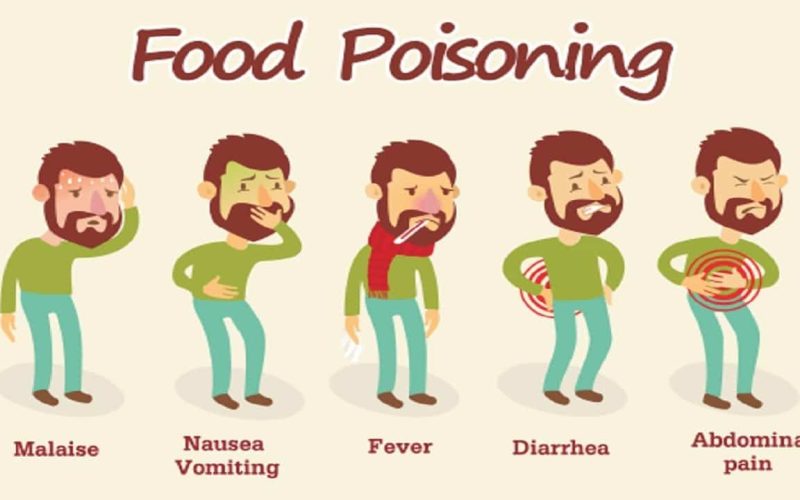Food and water are integral to the lives of every living thing, and man is no exception.
Not a day goes by without people craving something, whether hungry or not.
Well, for people who enjoy cooking like me, the love of food is the beginning of creativity.
There’s no limit to the beautiful, mouthwatering things you can create in a well-stocked kitchen.
For those who do not like to cook, fast foods are readily available to satisfy their hungry stomachs at any time of the day.
People tend to seek out sweet foods or new food at public gatherings like parties or holidays.
However, nothing hurts the living more than losing a loved one to food poisoning.
Our previous article introduced poisoning and discussed its history, so if you missed it, do well to check it out.
However, here is a brief recap of what poisoning is.
A Brief History of Poisoning
Poisoning has been a thing for as long as man’s existence. From our hunting and gathering ancestors down to today’s world, people have used various forms of poison for hunting, self-defense, and murder.
However, as bad as poisonous substances are, some of them have been used for purposes that are beneficial to health and can also help with modern technology.
Some of the drugs have become cures for several illnesses and contain a harmless amount of poisonous substances.
What is Food Poisoning?
When people from certain parts of the world hear about food poisoning, they imagine someone adding a toxic chemical substance to a victim’s food or drink to murder the victim.
However, food poisoning is not restricted to that. Food poisoning refers to illness caused by consuming contaminated foods.
Germs and bacteria can infect food anywhere, from processing, purchase, and cooking to consumption.
Parasites, bacteria, and viruses are the most common causes of foodborne illness. The toxins from these organisms and other toxins can harm the body of anyone who consumes them in food.
Furthermore, some people think food poisoning is nothing to panic about as they might have experienced a few days of stooling and vomiting in times past, and some home remedies helped them get well, or they just got better on their own.
Recent studies show that food poisoning causes up to six hundred million (600,000,000) illnesses and about Four hundred and twenty thousand (420,000) deaths around the globe yearly.
Meaning that at least one in ten people fall ill from what they eat or drink annually.
The carefree attitude of people towards food poisoning gives them the false notion that once they ingest an infected food or drink, the symptoms will manifest immediately, and they will find a cure as fast as they can.
That’s nothing close to the reality of some kinds of food poisoning. While some toxins may hit you in a few minutes, others could wait about 12 to 48 hours and crawl up to pay you a surprise visit.
Some other very annoying toxins could stay in the body for up to eight days after consumption before symptoms appear, making it difficult for the victim to figure out what he or she ate that may have caused the poisoning.
Some Common Causes of Food Poisoning
- Eating cold or lukewarm food: Some people are too impatient to heat their food to the right temperature before eating it. No matter how hungry you are, make sure to warm your food enough so it’s neither lukewarm nor cold.
- Eating dirty fruits: Most people are guilty of assuming that fruits with rinds are safe because the outer layer protects the flesh. The funny part is you might be right, but the moment you cut that fruit open without washing it correctly, you risk getting a foodborne disease.
- Eating raw or poorly cooked meat: Food poisoning from consuming raw or inadequately cooked meat is common. Thus, cook your meat thoroughly before you munch on it. Sometimes, fast food restaurants cook meat half-done, and you find traces of blood inside the flesh. If you are in such a situation, report such a restaurant to the appropriate authority and get yourself checked immediately.
- Leaving food exposed: Never expose food to open air when not eating. When the temperature is below 140 degrees Fahrenheit, there is every chance your meal will have germs dancing in it.
- Paying less attention to the environment: People can sometimes be poisoned when they do not pay attention to their food or drink while at a party or in places with other people around. Lots of people have had their drinks spiked when they were not watching. Thus, avoiding eating or drinking outside your house is safer if you are naturally carefree or cannot get your eyes off your phone screen.
Who is at Risk of Food Poisoning?
Anybody can be a victim of poisoning, but the most vulnerable set of people are children from the age of five and below (5-0YRS), pregnant women, and aged people.
Signs and Symptoms
The signs and symptoms of food poisoning vary according to the source of the contamination and the particular organ of the body that the toxins affect.
These are some of the most common symptoms to watch out for.
- Vomiting
- Nausea
- Abdominal cramp
- High fever
- Passing blood with stool and vomit
- Frequent Diarrhea for as long as three days
- Headaches
- Bloating
- Seizures
- General weakness
- Dehydration
- Dizziness
- Blurry vision
- Reactive arthritis
- Death (worst case scenario)
Food poisoning symptoms can manifest immediately after the infected food is consumed, a few minutes or hours after consumption.
Signs are unusually easy to detect when manifesting in groups of people who ate the same food.
However, only one group member who ate the same food can display poisoning symptoms. If symptoms are not detected and treated early enough, they gradually worsen.
Foodborne illnesses could last a few hours or days, but if immediate attention is not paid to a victim, it may result in death.
The Cure for Food Poisoning
When you notice any of the symptoms of food poisoning in someone around you, give them an oral rehydration solution to help them recover the fluid lost to stooling and vomiting.
If you notice the symptoms worsening, do not hesitate to take them to the closest hospital.








